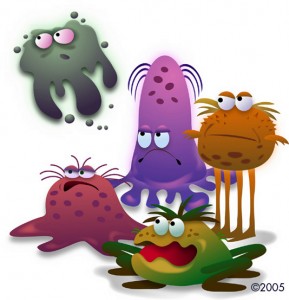 Which Kills Germs the Best?
Which Kills Germs the Best?
To start with, it’s important to understand how soap works. Soap is an emulsifying agent, capable dispersing oil in water. When people wash their hands, dirt and germs trapped in the natural oils of the skin are lifted and suspended in water. Except for antibacterial soap, regular soap really isn’t capable of killing a lot of germs. What soap is good for is lifting germs from the skin.
Coating the Hands With Soap or Hand Sanitizer
Whether hand sanitizer or soap is being used, it’s important to adequately coat and spread the hands with cleanser to ensure that soap or hand sanitizer comes in contact with every part of the hand where germs might be lurking. This means that any jewelry should be removed before soaping up.
How Long to Rub Hands with Soap or Hand Sanitizer
Experts recommend that at least 20 seconds be spent lathering up. Counting to 20 or saying the alphabet is a good way to ensure that enough time is being spent covering the hands with soap. Care should be taken to apply the lather to the backs of the hands and between fingers. Don’t forget to clean under nails too, as germs find the perfect sanctuary beneath fingernails.
Drying Hands
If using soap, rinse thoroughly and use a clean towel, paper towel, or dryer to dry hands. If using hand sanitizer, continue rubbing till hands are dry. Use a paper towel, if possible, to turn off the faucet and open the bathroom door to prevent re-infecting the hands.
How Much Alcohol Should Be In Hand Sanitizer?
It’s recommended that hand sanitizers contain at least 60% alcohol. The Food Safety Network’s fact sheet, “What are hand sanitizers?” (University of Guelph, 2003) reports that ethanol is more efficient at killing viruses than isopropanol.
Which Kills More Germs – Soap or Hand Sanitizer?
An ABC News report tested alcohol-based hand sanitizers, antibacterial soap and regular soap and found that alcohol-based hand sanitizers were able to kill more E. Coli bacteria on hands than either antibacterial or plain soap. They did not find a significant advantage in using antibacterial soap rather than regular soap. In fact, there are concerns that using antibacterial soap will only produce stronger, more resistant strains of bacteria.
Notes and Cautions on Using Hand Sanitizers
Because of the high percentage of alcohol used in hand sanitizers, it’s important to keep the following points in mind.
- Don’t light up a cigarette right after using hand sanitizers. Alcohol is flammable.
- Supervise children while they are using hand sanitizers. Some children have been known to ingest it by licking their hands, which could be harmful.
- Cuts or scratches on hands may burn or sting when they come in contact with sanitizer.